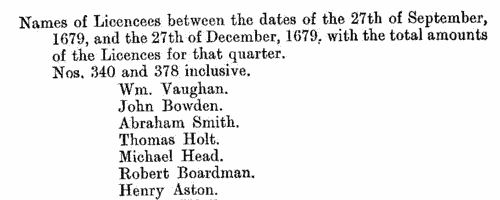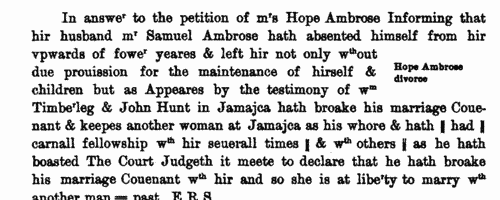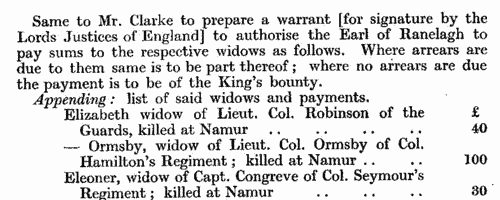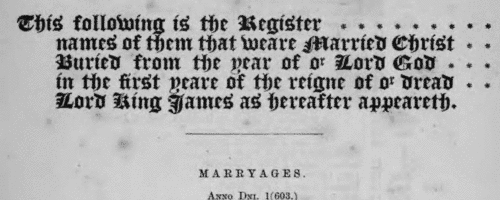Our indexes include entries for the spelling tippet. In the period you have requested, we have the following 74 records (displaying 1 to 10):
Official Papers
(1671)
The State Papers Domestic cover all manner of business relating to Britain, Ireland and the colonies, conducted in the office of the Secretary of State as well as other miscellaneous records. Includes lists of passes to travel abroad.
| Sample scan, click to enlarge

|
Lancashire and Cheshire Marriage Licences
(1667-1680)
Licences for intended marriages in Chester archdeaconry, which covered Cheshire and Lancashire south of the Ribble (by far the most populous part of that county) | Sample scan, click to enlarge

|
Letters and papers of James first duke of Ormond, Lord Deputy of Ireland
(1675-1685)
This correspondence deals with a large variety of personal and public affairs in Ireland and England. The collection also includes lists of Irish wool licences and licencees, 1678 to 1681 | Sample scan, click to enlarge

|
Massachusetts Criminals, Litigants, Lawyers and Jurors
(1673-1692)
The only surviving complete volume of the records of the courts held by the Governor and Assistants of the Colony of the Massachusetts Bay is for the period 1673 to 1692. It was transcribed by John Noble, and published by order of the Board of Aldermen of the City of Boston, New England, as County Commissioners of the County of Suffolk, Massachusetts. Under English law overseas colonies were generally deemed to fall under the jurisdiction of the Admiralty, and were subject to English law varied by local circumstances. These Courts of Assistants therefore also function as Courts of Admiralty; the courts had jurisiction over criminal cases and also in civil disputes between parties. In practice, many of the names that occur in the record are just those of the members of the grand jury and the lesser juries (appointed from among the adult male householders of the colony) before whom the cases were tried. | Sample scan, click to enlarge

|
Treasury Books
(1697-1698)
Records of the Treasury administration in Britain, America and the colonies, from 1 October 1697 to 31 August 1698. These also include records of the appointment and replacement of customs officers such as tide waiters and surveyors. | Sample scan, click to enlarge

|
Wandsworth Baptisms
(1711)
The ancient parish of Wandsworth in Surrey comprised the single township of Wandsworth, including the hamlets of Garratt, Half Farthing and Summers Town. It lay in the archdeaconry of Surrey of the diocese of Winchester: unfortunately, few bishop's transcripts of Surrey parish registers survive earlier than 1800. Although the original parish registers of Wandsworth doubtless commenced in 1538, the volume(s) before 1603 had been lost by the 19th century. In 1889 a careful transcript by John Traviss Squire of the first three surviving registers was printed, and we have now indexed it year by year. The baptism registers from 1603 to 1726 normally give date of baptism, and the names of the child and its father, but do not give date of birth or the mother's christian name. | Sample scan, click to enlarge

|
 Masters of Apprentices registered at Gloucester
(1723-1726) Masters of Apprentices registered at Gloucester
(1723-1726)
Apprenticeship indentures and clerks' articles were subject to a 6d or 12d per pound stamp duty: the registers of the payments usually give the master's trade, address, and occupation, and the apprentice's father's name and address, as well as details of the date and length of the apprenticeship. There are central registers for collections of the stamp duty in London, as well as returns from collectors in the provinces. These collectors generally received duty just from their own county, but sometimes from further afield. Because of the delay before some collectors made their returns, this register includes indentures and articles from as early as 1722. (The sample entry shown on this scan is taken from a Norfolk return) | Sample scan, click to enlarge

|
 Apprentices registered at Plymouth in Devon
(1728-1731) Apprentices registered at Plymouth in Devon
(1728-1731)
Apprenticeship indentures and clerks' articles were subject to a 6d or 12d per pound stamp duty: the registers of the payments usually give the master's trade, address, and occupation, and the apprentice's father's name and address, as well as details of the date and length of the apprenticeship. There are central registers for collections of the stamp duty in London, as well as returns from collectors in the provinces. These collectors generally received duty just from their own county, but sometimes from further afield. (The sample entry shown on this scan is taken from a Norfolk return) | Sample scan, click to enlarge

|
 Masters and Apprentices
(1737) Masters and Apprentices
(1737)
Apprenticeship indentures and clerks' articles were subject to a 6d or 12d per pound stamp duty: the registers of the payments usually give the master's trade, address, and occupation, and the apprentice's father's name and address, as well as details of the date and length of the apprenticeship. 1 January to 31 December 1737 | Sample scan, click to enlarge

|
 Apprentices and trainee clerks
(1763) Apprentices and trainee clerks
(1763)
Apprenticeship indentures and clerks' articles were subject to a 6d or 12d per pound stamp duty (late payment of the 6d rate attracted double duty (D D) of 12d): the registers of the payments usually give the master's trade, address, and occupation, and the apprentice's name, as well as details of the date and length of the apprenticeship. 1 January to 9 December 1763. | Sample scan, click to enlarge

|
Research your ancestry, family history, genealogy and one-name study by direct access to original records and archives indexed by surname.












